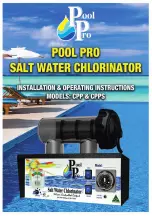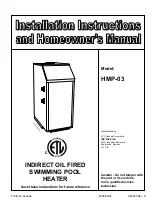
5. MAINTENANCE AND INSPECTION
an acceptable level to make certain that flammable refrigerant does not remain within the
lubricant. The evacuation process shall be carried out prior to returning the compressor to the
suppliers. Only electric heating to the compressor body shall be employed to accelerate this
process. When oil is drained from a system, it shall be carried out safely.
Decommissioning
Before carrying out this procedure, it is essential that the technician is completely familiar
with the equipment and all its detail. It is recommended good practice that all refrigerants are
recovered safely. Prior to the task being carried out, an oil and refrigerant sample shall be
taken in case analysis is required prior to re-use of reclaimed refrigerant. It is essential that
electrical power is available before the task is commenced.
a) Become familiar with the equipment and its operation.
b) Isolate system electrically.
c) Before attempting the procedure ensure that:
. Mechanical handling equipment is available, if required, for handling refrigerant cylinders;
. All personal protective equipment is available and being used correctly;
. The recovery process is supervised at all times by a competent person;
. Recovery equipment and cylinders conform to the appropriate standards.
d) Pump down refrigerant system, if possible.
e) If a vacuum is not possible, make a manifold so that refrigerant can be removed from
various parts of the system.
f) Make sure that cylinder is situated on the scales before recovery takes place.
g) Start the recovery machine and operate in accordance with manufacturer's instructions.
h) Do not overfill cylinders. (No more than 80 % volume liquid charge).
i) Do not exceed the maximum working pressure of the cylinder, even temporarily.
j) When the cylinders have been filled correctly and the process completed, make sure that
the cylinders and the equipment are removed from site promptly and all isolation valves on
the equipment are closed off.
k) Recovered refrigerant shall not be charged into another refrigeration system unless it has
been cleaned and checked.
Charging procedures
In addition to conventional charging procedures, the following requirements shall be
followed.
-
Ensure that contamination of different refrigerants does not occur when using charging
equipment. Hoses or lines shall be as short as possible to minimise the amount of
refrigerant contained in them.
-
Cylinders shall be kept upright.
-
Ensure that the refrigeration system is earthed prior to charging the system with
refrigerant.
-
Label the system when charging is complete (if not already).
-
Extreme care shall be taken not to overfill the refrigeration system.
Prior to recharging the system it shall be pressure tested with OFN. The system shall be leak
tested on completion of charging but prior to commissioning. A follow up leak test shall be
carried out prior to leaving the site.
The safety wire model is 5*20_5A/250VAC. And must meet the explosion-proof
Summary of Contents for 7026965
Page 28: ...4 OPERATION AND USE Controller interface diagram and definition ...
Page 35: ...5 MAINTENANCE AND INSPECTION requirements ...
Page 45: ...Note Code 83900146 ...
Page 74: ...4 BETJENING OG BRUG Controllergrænsefladens diagram og definition ...
Page 91: ...6 SPECIFIKATION Bemærk Kode 83900146 ...
Page 120: ...4 BETRIEB UND VERWENDUNG Steuerungsschnittstellendiagramm und Definition ...
Page 137: ...Hinweis Code 83900146 ...
Page 166: ...4 FONCTIONNEMENT ET UTILISATION Schéma et définition de l interface du contrôleur ...
Page 183: ...Remarque Code 83900146 ...
Page 212: ...4 WERKING EN GEBRUIK Controller interface diagram en definitie ...
Page 229: ...Nota Code 83900146 ...
Page 257: ...4 DRIFT OCH ANVÄNDNING Controller gränssnittsschema och definition ...
Page 273: ...Notera Kod 83900146 ...
















































